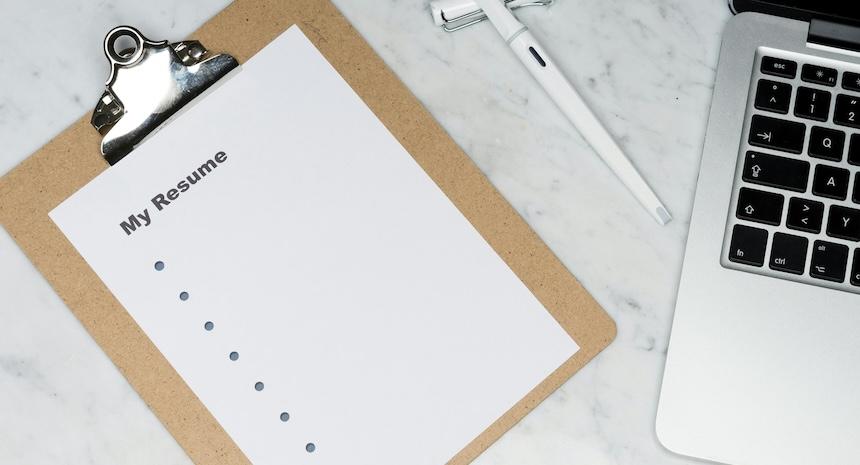When numbers are your thing, writing a banker resume can feel like a roadblock in the job search process.
But we’re here to help!
Just use our easy-to-follow instructions on how to write a resume and some excellent resume examples as a guide and the task of resume writing can be as easy as one, two, three. You can count on it!
Here, we’ll teach you exactly what you need to know to write an impressive banker resume in a matter of minutes.
Read on to learn more about:
- Examples of banker resumes for applicants with and without experience.
- What makes a banker resume example great.
- Tips and tricks for writing banker resumes.
- What to include in every section of your banker resume.
- How to choose the right resume template and format for our industry.
- How to identify keywords for your resume.
If you’re ready to make your resume today, head directly to our AI Resume Builder. There, you can choose a design of your liking and get advice and easy-to-edit, auto-generated text for every section.
Banker resume examples
What makes this a great banker resume sample?
-
Excellent resume objective
While this job seeker has limited work experience, he does have some relevant experience and valuable transferable skills, which he highlights in the resume objective section. Since this is the first section a recruiter will read, making it stand out is critical to enticing them to read the rest of your resume.
-
Strong skills sections
Because this applicant has limited work experience, he detailed his banker resume skills in depth on multiple spots on the document. By employing the use of multiple skills sections (Skills, Professional Skills and Summary of Qualifications), this applicant demonstrates that he has a set of transferable skills that will help him succeed in the role.
-
Relevant coursework
Since this job seeker has an MBA, which is a sought after academic credential in banking, he lists it and elaborates on it through the use of a “Relevant coursework” section. Here, he lists the courses he has completed that are most relevant to the role, showing the employer that he has the training to do the job.
What makes this a great banker resume sample?
-
Industry-appropriate resume template
This applicant chose a banking resume template that is conservative but that uses a pop of subdued color to give it personality.
-
Proper resume format
Because this applicant has experience in the banking industry, she has chosen to use a chronological resume format, which showcases her career trajectory. This is the format that experienced applicants should use. Plus, it’s the format that recruiters and hiring managers prefer.
-
Utilizes data and metrics
The content of this resume is strong, in part, because of the job seeker’s use of data and metrics. These numbers not only are eye-catching but they also provide concrete examples of the impact her work has had.
Choose a format for your banker resume
Banking is a competitive field, so to land the job you want, you need to write a resume that shows that you’re the right person for the job at-a-glance. To do that, you’ll need to select the right resume format.
There are three different resume formats successful job seekers use:
- Chronological: If you’re writing a banking resume as an experienced applicant, consider utilizing a chronological resume format, which will highlight your work experience and showcase your strong career progression.
- Functional: Applicants with less experience will want to put the focus on their transferable skills and should consider using a functional resume format, which highlights skills over work experience.
- Combination: For midcareer professionals who want to showcase both relevant work experience and a strong skill set, the combination resume format offers the best of both worlds.
Visit our guide on how to format a resume to learn more about how to put your most relevant information front and center on your banker resume.
Selecting the right resume template
Regardless of your level of experience, every banker resume will have five basic sections — a header, a professional summary or resume objective, skills, work history and education. However, not all resumes will look the same. You can customize the design of your banker resume by selecting the right template.
Since banking is a conservative field, choosing a buttoned up resume template is appropriate. Consider one of our professional or modern resume templates, which are eye-catching yet understated. Or, browse our template library to see if one of our simple templates is more your style.
How to write a banker resume in 5 simple steps
The secret to standing out when applying for competitive roles like a banker is to personalize your resume for every application. Here’s how you do it.
Step 1
Study the banker job description
A banker resume that passes to the interview stage is one that’s customized to the job ad. Why? Because the job listing outlines everything you need to know about the key requirements of the role. By addressing the specific requirements the employer is looking for, you’re making it obvious that you’re who they’re looking for.
If there aren’t enough details in the job description, do some research on your own to learn more about what candidates for top banking jobs have in common. If you take the time to customize your resume to the job each time you apply, you’ll improve your chances of passing through the applicant tracking system (ATS) and landing a job interview.
Step 2
Write a professional summary or resume objective
Your banker resume should include either a professional summary or a resume objective at the top. Which type of resume profile you choose will depend on your level of work experience.
Less experienced applicants should choose a resume objective, which states your transferable skills and your career goals. Those with more direct experience in banking should use a professional summary, which outlines your skills and experience and highlights some of your most notable professional accomplishments.
Here are some strong examples for your banker resume:
Banker professional summary example:
Results-driven investment banker with nine years of experience in developing and executing successful investment strategies for clients across a range of industries. Earned the Chartered Financial Advisor (CFA) designation in 2018. Demonstrated track record of achieving outstanding financial results through meticulous research, analysis and creative deal structuring. In 2021, developed and executed investment strategies resulting in an average annual return of 7%. Proven ability to build strong client relationships and deliver exceptional service while managing complex transactions.
Banker resume objective example:
Highly motivated and detail-oriented individual seeking an entry-level Personal Banker role at Jonestown Community Bank. Certified Financial Planner (CFP) with strong analytical, customer service and communication skills. Strong understanding of banking regulations and compliance procedures and knowledgeable in various financial products, including loans, mortgages and savings accounts. Seeking to leverage my training and certifications to provide exceptional financial guidance to clients and help them achieve their financial goals.
Step 3
Highlight your most relevant banker skills
Whether you’re a banking executive or an entry-level applicant, hiring managers will be looking closely at the banking resume skills you list. Skills for a banker resume should be added to your resume skills section and woven throughout your professional summary (or resume objective) and your work experience section.
Banking is a profession that requires a mix of hard and soft skills so it’s important to reflect that on your resume. Hard skills are the technical and measurable skills needed to perform a job, like math.
Soft skills, on the other hand, are personality traits that make you great at your job. To help you understand the difference between the two, we’ve created a side-by-side list of hard and soft skills to help you create a standout skills section.
Hard and soft skills for a banker resume
- Knowledge of financial products
- Understanding of banking regulations
- Strong math skills
- Accounting
- Risk management
- Business development
- Customer service
- Relationship-building
- Communication
- Time management
- Problem-solving
- Conflict resolution
Here is an example of a strong banker skills section:
- Certified Financial Planner (CFP)
- Strong understanding of banking regulations and compliance procedures
- Knowledgeable in various financial products, including loans, mortgages and savings accounts
- Outstanding math and accounting skills
- Proven ability to analyze financial data and make informed decisions
- Excellent communication and relationship-building skills
- Proficient in Microsoft Office Suite and various banking software systems
Don’t underestimate the value of soft skills on your resume. These skills are highly valued by employers, in part, because they are difficult to teach. For that reason, employers look for applicants with those skills, even for roles that aren’t public facing.
Step 4
Write a strong banker work experience section
While the background and experience required will be different for each banking role, to get noticed you need to write a work experience section that demonstrates what you will bring to the table.
Here is an example of a great banker work experience entry:
Personal Banker, Newark Community Bank – Newark, NJ1/2019 – Present
- Achieved top 10% sales performance in the region for mortgage loans and personal loans, and top 5% sales performance for credit cards.
- Built and maintained relationships with over 150 high-value clients, resulting in an 85% client retention rate.
- Proactively identified and resolved client issues, resulting in a 92% satisfaction rate in client surveys.
- Conducted in-depth financial analysis to identify client needs and recommend appropriate banking products and services, resulting in an average annual revenue growth of 15%.
- Ensured compliance with all banking regulations and policies.
- Mentored and trained entry-level personal bankers on bank policies and processes, customer service, sales techniques and banking regulations.
Make your banking credentials pop by using data and metrics and descriptive action words to capture the attention of a hiring manager.
Step 5
Showcase your education and training on your banker resume
While the educational requirements for becoming a banker vary depending on the employer and location, typically candidates for a banker position need at least a bachelor’s degree in finance, business administration, accounting or a related field. Some employers may also require candidates to have particular certifications, such as the Certified Financial Planner (CFP) or Chartered Financial Analyst (CFA) designations.
When listing your degrees, start with the highest degree you have earned and work backward. Certifications can be listed at the end of the education section or in a special section with the header “Certifications.”
How to list your banker education:
Education
- Master of Business Administration in Finance, St. John’s University, 2021
- Bachelor of Science in Business Administration, Minor in Finance, San Francisco State University, 2019
Certifications
- Certified Financial Planner (CFP), Certified Financial Planner Board of Standards, Inc., 2020
Only list your date of graduation if you have recently completed your degree. Otherwise, adding dates could introduce age bias into the hiring process.
Optional sections for your banker resume
Awards and certifications
In a field as competitive as banking, you have to outshine the competition to land the opportunities you want. Adding awards and certifications to your resume is a way to flaunt your successes, even if you don’t have much work experience yet.
From academic achievements to professional certifications and honors, awards can help showcase your dedication to your field and the level of expertise you’ll bring to the table if you get hired.
How to list awards on your banker resume:
2023 Rising Star Banker – Tucson Central Bank
2022 CFA Charter-holder – CFA Institute
2020 Best MBA Thesis Award – St. John’s University
Projects
Regardless of your level of experience, adding projects to your resume can help your application. For entry-level bankers, adding projects is a great way to show employers how you apply the skills you’ve learned. For more experienced bankers, listing projects is a tangible way to show how you’ve used the skills listed on your resume.
To list projects, use a header that lists the name of the project (or type of project) and then describe the results — doing so will show potential employers what you’ll bring to the table if you’re hired.
How to list projects on your banker resume:
2020 Customer Retention Project:
Increased customer retention rate in 2020 by 20% and generated an additional $100,000 in revenue in the first year of implementation.
Languages
As a banker, the more people you can communicate with the better, which is why having the ability to speak multiple languages is a huge advantage in the job search. Whether you can hold a conversation or are fluent in another language, be sure to list it on your resume.
How to list languages on your banker resume:
- English: Fluent
- Spanish: Fluent
- Portuguese: Conversational
Interests and hobbies
In a highly conservative field like banking, adding hobbies to your resume is appropriate as long as they are neutral — i.e. not religious or political in nature — or are relevant to your field.
Used thoughtfully, adding interests and hobbies to your resume can show that you are a well-rounded person and can emphasize your transferable skills, like creativity or leadership.
How to list interests and hobbies on your banker resume:
- Avid reader of books on trading and asset management
- Volunteer tax preparer – Teaneck Senior Center
- Volunteer – Big Brother and Big Sisters, Northfield, NJ
resumes made with Resume Now!
Add a cover letter
Adding a banker cover letter to your resume shows you are willing to go the extra mile, plus allows you more space to prove that you’re the person the company is looking for.
Learning how to write a cover letter for a banker job is a skill that can get you to the interview stage. Use our cover letter examples to see how a cover letter should be formatted and what to express in each part of the letter.
Or, if you want to skip the writing, use our professional Cover Letter Generator for a job-specific cover letter in minutes. Our builder offers professionally written text suggestions for every section of your document. Choose whether to use the content as-is or easily customize it to suit your needs.
Key takeaways for your banker resume
-
Select the appropriate format
The format you choose is dependent on your level of experience. If you’re an entry-level banker, consider using a functional or combination resume format to make your academics and skills shine. More experienced bankers should use a chronological resume format to showcase their career trajectory.
-
Choose an appropriate resume template
Most banks and financial institutions are conservative organizations. For that reason, most job seekers will want to choose a subdued resume design..
-
Study the job ad
Never use generic resume content when writing your banker resume. Look to the job description for the specific skills and experience the employer is seeking and customize your resume to each job application.
-
Follow our simple resume-writing tips
By using our five simple steps, you’ll be able to quickly produce a standout resume.
-
Include extra resume sections
Especially for entry-level applicants who lack relevant work experience, adding extra sections is a great way to add depth to your resume. Whether you list awards, interesting hobbies or languages that you speak, these special sections can set you apart from the competition.
-
Stand out with a cover letter
As someone seeking work in the competitive banking industry, including a well-written cover letter can set you apart from the competition and increase your chances of landing a job interview.
FAQs from job seekers
Last Updated: February 26, 2025
- What’s the difference between a CV and a resume?
- What belongs in a resume profile?
- How do I write the perfect resume?
- Should I write my resume using Microsoft Word?
- How do I list references on a resume?
- How do I write the perfect resume?
- Do Google templates work for a resume?
- How do I update my resume?
Was this information about Banker Resume: Examples, Templates & Tips helpful? Let us know!
Heather is the Content Strategy Manager for Resume Now and a Certified Professional Resume Writer (CPRW) with more than ten years of experience writing about job search and career topics. She is based in San Francisco.
More resources

What Is an Elevator Pitch for an Interview? + Examples
Imagine you step into an elevator and right beside you is a h...

Bullet Points on Resume: Examples & Guide for 2025
Bullet points on your resume make your experience and accompli...

10 High-Paying Side Jobs You Can Do From Home
Paying down debt covering your bills saving for a vacation ...

Doctor Resume: Examples, Templates & Tips
Make a doctor resume that gets interviews. Use our 2025 writin...

Internship Resume: Examples, Templates & Tips for 2025
Browse a collection of internship resume examples and learn ho...

Medical Scribe Resume: Examples, Templates and Tips
Check out our guide for help writing a job-winning medical scr...


